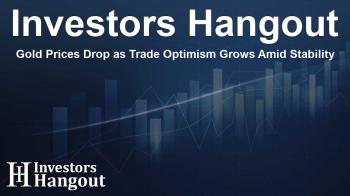Gold Prices Drop as Trade Optimism Grows Amid Stability

Gold Continues to Decline
Gold prices have recently slipped, trending toward $3,272 as concerns ease over geopolitical tensions and market sentiment shifts towards riskier assets. This marks a significant decline, putting gold at its lowest level in about a month. Investors have shown increased confidence following a fragile ceasefire between regional powers, reducing fears of a broader conflict and prompting them to pivot towards more favorable investment opportunities.
Market sentiment received an additional boost with the announcement of a recent trade agreement between the US and China. Meanwhile, positive signals regarding ongoing negotiations with India and the finalization of deals with Mexico and Vietnam have heightened expectations for enhanced global trade stability. This optimism has led to a notable drop in gold demand, typically sought after as a safe haven during uncertain times.
As the market focuses on critical labor data from the US, attention is also on upcoming reports, including Job Openings, the ADP Employment Report, and nonfarm payrolls. Investors will be analyzing these economic indicators for insights into the US economy's health, which may greatly influence the Federal Reserve’s monetary policy approach. Depending on the outcomes, there could be significant implications for gold's trajectory in the short term.
Market Reactions to Economic Indicators
Gold (XAU/USD) showed some resilience during early trading sessions, bouncing back slightly as investors awaited comments from European Central Bank (ECB) President Christine Lagarde, scheduled for later in the day. Her remarks will be scrutinized for any signs of a shift in the interest rate landscape, which could impact the appeal of gold as an investment. If she leans toward a more dovish outlook than currently anticipated, it could weigh heavily on gold prices, reinforcing expectations of a continued accommodative stance in monetary policy.
Euro Strengthens in Response to Trade Developments
The euro has seen a slight increase, reaching 1.17500, buoyed by the sentiment around trade negotiations. It surged to its highest level since the previous September, reflecting the overall weakness of the US dollar. This trend has emerged as the markets recalibrate expectations for the Federal Reserve’s policy direction amid indications of slower growth in the US economy and favorable data from Europe. Recent consumer spending metrics revealed a drop, attributed to decreased demand in significant retail sectors, further supporting the notion that the Fed might consider easing policy to bolster growth.
Japanese Yen Displays Strength Amid Global Sentiment Shifts
The Japanese yen has shown strength, reaching toward a two-week high against the dollar. As the confidence in a dovish shift at the Federal Reserve builds, the yen has benefited from the overall depreciation of the dollar. Investors continue to remain vigilant regarding key economic indicators this week, particularly labor market data, which could influence future Fed rate decisions.
In Japan, recent figures indicated that industrial production fell short of expectations last month, attributed to ongoing challenges posed by US tariffs. These tariffs, particularly the 25% on car imports, have strained negotiations and impacted business sentiment. Looking ahead, financial markets are set to pay close attention to the upcoming Bank of Japan's quarterly Tankan survey as it may provide further insights into corporate perspectives and the economic outlook, potentially affecting the yen's future trajectory.
Understanding the Broader Market Context
The developments within gold, the euro, and the Japanese yen are interconnected as they represent shifts in investor sentiment and geopolitical stability. As market participants weigh the implications of trade agreements and economic reports, there's a palpable tension between risk aversion and the allure of growth-oriented assets. For many investors, the current landscape presents both challenges and opportunities, forcing a reassessment of traditional safe-haven strategies.
Frequently Asked Questions
What factors are currently influencing gold prices?
Gold prices are primarily influenced by geopolitical tensions, trade agreements, and labor market data from the US that can signal potential changes in Federal Reserve policies.
How does the recent trade agreement affect market sentiment?
The trade agreement bolsters market confidence, encouraging investors to shift from safe-haven assets like gold to riskier investments, thereby reducing gold demand.
What is the significance of the European Central Bank President's speech?
Christine Lagarde's speech is critical as it may hint at changes in interest rate policies, impacting both the euro and gold prices.
How is the Japanese yen performing currently?
The Japanese yen has strengthened, partly benefitting from a weaker US dollar and changing market sentiment amidst economic uncertainties.
What should investors watch for in the upcoming labor market data?
Investors should closely monitor the job openings, ADP employment report, and nonfarm payroll data as they could indicate the health of the labor market and influence Fed rate policy.
About The Author
Contact Ryan Hughes privately here. Or send an email with ATTN: Ryan Hughes as the subject to contact@investorshangout.com.
About Investors Hangout
Investors Hangout is a leading online stock forum for financial discussion and learning, offering a wide range of free tools and resources. It draws in traders of all levels, who exchange market knowledge, investigate trading tactics, and keep an eye on industry developments in real time. Featuring financial articles, stock message boards, quotes, charts, company profiles, and live news updates. Through cooperative learning and a wealth of informational resources, it helps users from novices creating their first portfolios to experts honing their techniques. Join Investors Hangout today: https://investorshangout.com/
The content of this article is based on factual, publicly available information and does not represent legal, financial, or investment advice. Investors Hangout does not offer financial advice, and the author is not a licensed financial advisor. Consult a qualified advisor before making any financial or investment decisions based on this article. This article should not be considered advice to purchase, sell, or hold any securities or other investments. If any of the material provided here is inaccurate, please contact us for corrections.

